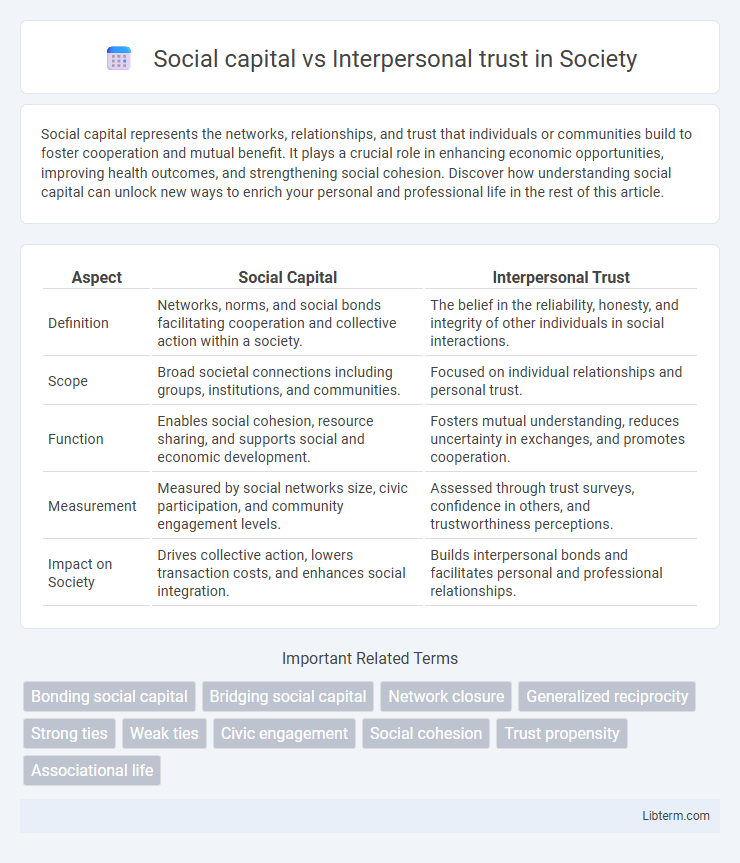Social capital represents the networks, relationships, and trust that individuals or communities build to foster cooperation and mutual benefit. It plays a crucial role in enhancing economic opportunities, improving health outcomes, and strengthening social cohesion. Discover how understanding social capital can unlock new ways to enrich your personal and professional life in the rest of this article.
Table of Comparison
| Aspect | Social Capital | Interpersonal Trust |
|---|---|---|
| Definition | Networks, norms, and social bonds facilitating cooperation and collective action within a society. | The belief in the reliability, honesty, and integrity of other individuals in social interactions. |
| Scope | Broad societal connections including groups, institutions, and communities. | Focused on individual relationships and personal trust. |
| Function | Enables social cohesion, resource sharing, and supports social and economic development. | Fosters mutual understanding, reduces uncertainty in exchanges, and promotes cooperation. |
| Measurement | Measured by social networks size, civic participation, and community engagement levels. | Assessed through trust surveys, confidence in others, and trustworthiness perceptions. |
| Impact on Society | Drives collective action, lowers transaction costs, and enhances social integration. | Builds interpersonal bonds and facilitates personal and professional relationships. |
Understanding Social Capital
Social capital encompasses networks, norms, and social trust that facilitate coordination and cooperation for mutual benefit, while interpersonal trust specifically refers to the confidence individuals have in one another's reliability and integrity. Understanding social capital involves recognizing how interpersonal trust acts as a foundational element that strengthens community ties and enhances collective action. High levels of social capital correlate with improved social cohesion, economic development, and effective governance.
Defining Interpersonal Trust
Interpersonal trust refers to the belief in the reliability, integrity, and competence of others within social relationships, enabling cooperation and positive interactions. It is a fundamental component of social capital, which encompasses the broader networks, norms, and social ties that facilitate collective action. Understanding interpersonal trust involves examining its role in reducing uncertainty and fostering mutual expectations in personal and professional contexts.
Components of Social Capital
Social capital consists primarily of three components: bonding, bridging, and linking social capital, which capture ties within groups, between diverse groups, and connections to institutions, respectively. Interpersonal trust, a critical element of bonding social capital, facilitates cooperation and reciprocal relationships among individuals. Understanding these components highlights how social capital extends beyond mere trust to include network structures and institutional relationships essential for social cohesion and community development.
Forms and Types of Trust
Social capital encompasses networks, norms, and social relationships that facilitate cooperation, while interpersonal trust specifically refers to the confidence individuals place in one another within these relationships. Forms of trust include cognitive trust, based on rational assessment and reliability, and affective trust, grounded in emotional bonds and empathy. Types of trust vary from generalized trust, extended to strangers or society at large, to particularized trust, which is reserved for close, personal connections.
Social Capital’s Role in Communities
Social capital encompasses the networks, norms, and social trust that facilitate coordination and cooperation for mutual benefit within communities. It strengthens community resilience by fostering collective action, enhancing access to resources, and promoting social cohesion. Interpersonal trust, a component of social capital, underpins these networks by enabling reliable interactions and reducing transaction costs among individuals.
Trust as a Foundation for Relationships
Trust serves as the foundational element in building strong social capital and fostering meaningful interpersonal relationships. High levels of interpersonal trust enhance cooperation and collective action within communities, leading to robust social networks and mutual support systems. Empirical studies reveal that societies with greater interpersonal trust experience increased social cohesion and economic growth due to stronger social capital.
Interplay Between Social Capital and Trust
Social capital and interpersonal trust are deeply interconnected, as trust acts as a fundamental component facilitating social networks and cooperative relationships within communities. High social capital enhances the development of trust by promoting shared norms, reciprocity, and collective action among individuals and groups. This interplay strengthens social cohesion, enabling efficient resource exchange and fostering resilient social structures essential for economic and social development.
Measuring Social Capital vs Interpersonal Trust
Measuring social capital involves assessing networks, norms, and social cohesion through indicators like community engagement, participation in civic activities, and trust in institutions. Interpersonal trust is typically measured using survey questions that evaluate individual trustworthiness perceptions within relationships or social interactions. Quantitative metrics for social capital often encompass both bonding and bridging ties, while interpersonal trust measurements focus more narrowly on direct, reciprocal trust between individuals.
Impacts on Society and Organizations
Social capital enhances community cohesion and organizational collaboration by fostering strong networks and shared values, which lead to increased collective action and resource exchange. Interpersonal trust directly influences workplace efficiency and societal stability by reducing transaction costs and promoting cooperative behavior among individuals. Both social capital and interpersonal trust significantly contribute to economic development and social well-being, yet social capital operates on a broader communal level while interpersonal trust centers on dyadic relationships within organizations.
Building and Sustaining Both Factors
Building social capital requires fostering strong networks and a sense of community, while interpersonal trust develops through consistent, transparent interactions and reliability. Sustaining both factors depends on ongoing engagement, mutual support, and shared norms that reinforce cooperation and collective action. Effective communication and conflict resolution strategies are essential to maintain and deepen trust and social capital over time.
Social capital Infographic

 libterm.com
libterm.com